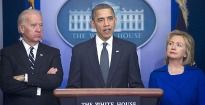Obama: U.S. 'On Track' in Afghanistan
President Obama said Thursday that "we are on track to achieve our goals" in the Afghan war and to "start reducing our forces next July."
Announcing the results of a one-year review of his war strategy, Obama said, "This continues to be a difficult endeavor." In many places, he said, "the gains we've made are fragile and reversible."
Obama made particular reference to an "urgent need for political and economic progress in Afghanistan" to match what he described as significant military success in offensives to clear Taliban strongholds in the southern part of the country.
In Pakistan, Obama said, "progress has not come fast enough" in eliminating al-Qaeda and Taliban sanctuaries near the Afghanistan border. "We continue to insist to Pakistani leaders that terrorist havens inside their borders must be dealt with," he said.
Overall, Obama said, there has been "significant progress" in the goal of "disrupting, dismantling and defeating" al-Qaeda - an objective he set when he announced expanded military and civilian deployments.
"Today, al-Qaeda's senior leadership in the border region is under more pressure than at any point since they fled Afghanistan" in 2001, he said.
A written White House review of the strategy concluded that it is "showing progress" against al-Qaeda and in Afghanistan and Pakistan but that "the challenge remains to make our gains durable and sustainable," according to a summary document released early Thursday.
Taliban momentum has been "arrested in much of the country and reversed in some key areas, although these gains remain fragile and reversible," the five-page summary said.
The review, it said, indicated that the administration was "setting conditions" to begin the "responsible reduction" of U.S. forces in Afghanistan in July.
The overview of the long-awaited report contained no specifics or data to back up its conclusions. The actual assessment document is classified and will not be made public, according to an administration official who said that interested members of Congress would be briefed on it in January
Obama appeared before reporters Thursday to announce the results of the review, which was compiled from reports submitted by military, diplomatic and intelligence officials since mid-October. Flanking him at the White House briefing were Vice President Biden, Secretary of State Hillary Rodham Clinton, Defense Secretary Robert M. Gates and Marine Gen. James E. Cartwright, vice chairman of the Joint Chiefs of Staff.
Last December, Obama ordered the deployment of 30,000 additional U.S. troops in a buildup designed to stop insurgent momentum in Afghanistan and ultimately reverse it, particularly in the Taliban heartland in the southern part of the country. Based on conditions on the ground, Obama said, he would begin to reduce the size of the U.S. force, which now numbers about 100,000, after 18 months, or in July 2011.
Development aid and governance programs were also expanded in Afghanistan, along with the number of U.S. civilian officials on the ground. In Pakistan, military and economic assistance were significantly increased under the strategy, and elements of a long-term strategic partnership were put in place.
The explicit stick that accompanied those carrots was a warning that if the Pakistani military did not take significantly more aggressive action against al-Qaeda and insurgent sanctuaries in tribal areas along the Afghanistan border, the United States would be forced to act on its own.
With tacit Pakistani acquiescence, Obama also ordered an escalation in missile attacks from U.S. drone aircraft against the insurgent targets.
The "overarching" goal of the strategy, Obama said in a Dec. 1, 2009, speech delivered at the U.S. Military Academy at West Point, was to "disrupt, dismantle, and defeat al-Qaeda in Afghanistan and Pakistan, and to prevent its capacity to threaten America and our allies in the future."
He directed his national security staff to perform a "diagnostic" assessment of the strategy after one year. In recent months, senior administration officials have played down the importance of the review, saying they anticipated the diagnosis would lead to only minor strategic adjustments.
Even as the assessment was being compiled, Obama and his top national security advisers have been telegraphing the positive conclusions for weeks in public statements. At the same time, senior officials have expressed continuing concern over the durability of gains in Afghanistan and continuing doubts over Pakistan's commitment.
According to the assessment summary, there has been "significant progress in disrupting and dismantling the Pakistan-based leadership and cadre of al-Qaeda over the past year. Al-Qaeda's senior leadership has been depleted, the group's safe haven is smaller and less secure, and its ability to prepare and conduct terrorist operations has been degraded in important ways."
The progress has "diminished -- but not halted -- the group's ability to advance operations against the United States and our allies and partners, or to support and inspire regional affiliates."
The overview praised Pakistan for taking action against "extremist safe havens" in gains that "came at great costs" in military and civilian terms there. It described improved security cooperation and greater coordination in border operations.
Click here to read more.


